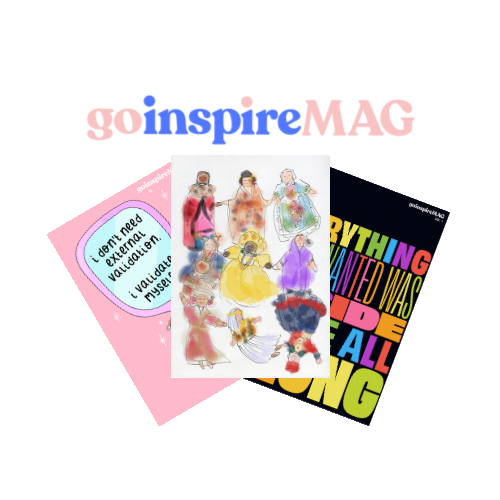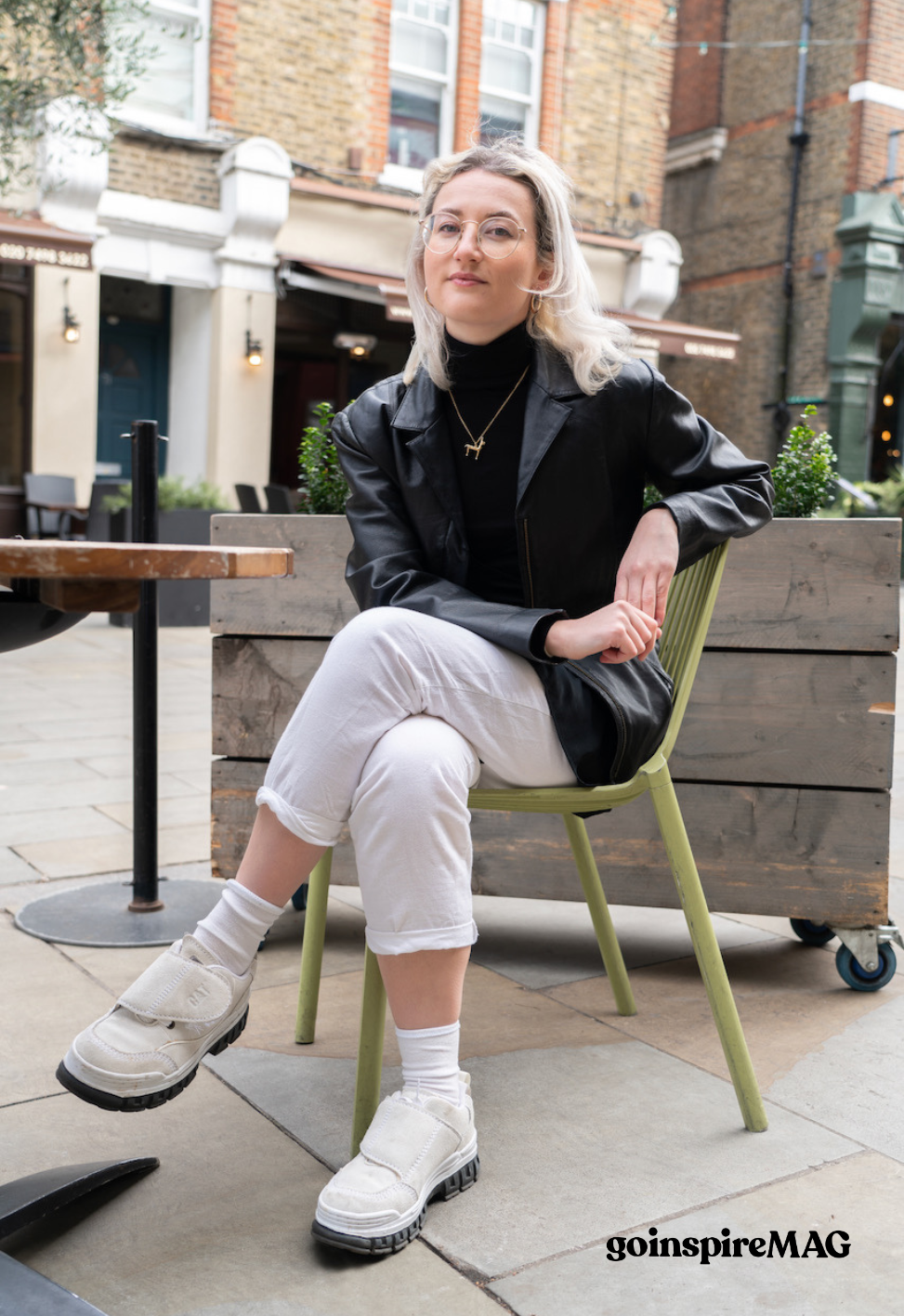Interview: Eliza Hatch
- Go Inspire Magazine

- Jul 20, 2022
- 5 min read
Updated: Aug 18, 2023
As a magazine that strives to create a sense of community between women, it is impossible to ignore the daily challenges that women, girls, and other marginalised genders experience. In March 2021, the UN released a report that revealed that 97% of 18-24 year old women had experienced sexual harassment. This is not even considering the harassment directed at teenage girls. Seeing a near-unanimous statement on the prevalence of harassment towards women such as this, it’s difficult to think of solutions that can tangibly bring positive change to the rampant misogyny in the UK. And then we got in contact with Eliza Hatch…
Eliza Hatch is best known for her social media campaign, Cheer Up Luv, a photography series that helps victims of sexual harassment reclaim public spaces with power and confidence. Soon to be launching her exhibition, Hysterical, alongside Bee Illustrates, it was high time for a chat with Hatch about the inspirations behind her work and the social backdrop that drives her.
GI: Why do you think it’s taken so long for sexual harassment to become a crime?
EH: There’s a multitude of reasons that factor into why public sexual harassment still isn’t a crime, and also why it still goes unreported on a large scale. From the biases that people have towards victims and arduous reporting processes that can leave people more traumatised than before, to the toxic behaviour that's so normalised it still doesn’t even register as harassment to some people.
The latter was definitely the case for me when I was at school. There was such a lack of education around what was acceptable and unacceptable behaviour in the classroom. My friends and I just brushed off every experience we had with "at least it wasn’t rape”.
This was also mirrored in the actions of some of my teachers. If boys tried to put their hands up our skirts, we would be told off for the length of our skirts. If boys in our class pinged our bra straps, we were scolded for wearing colourful bras or makeup. The bottom line was: if we experienced sexual harassment, it was our fault for attracting the attention. That's an unhealthy attitude to have ingrained into you from a young age.
The campaigners, @ourstreetsnow, released a survey asking students about violence and sexual harassment in the classroom. They found that only 14% of students had been told about sexual harassment and that 72% of pupils who did report public sexual harassment described receiving a negative response from their school.
I personally think that we need a two-pronged approach. We need to focus more on education around the issue rather than only focusing on carceral solutions. There is absolutely no doubt in my mind that education would have a positive effect on the above statistics and would make children, adult women, and marginalised genders feel safer moving forward.
GI: Who influenced you growing up who made you notice the misogyny in today’s society that so many ignore?
EH: I was heavily influenced by the strong women in my life growing up, but I didn't really have a grasp on what feminism was until I went to university, and certainly didn’t act on that
knowledge until after I graduated and started experiencing rampant workplace and street
harassment firsthand.
I think its extremely important to share stories of sexual harassment, because, for far too long, people have brushed off their experiences and suffered in silence. One of the main reasons I began my campaign five years ago was because my own male friends dismissed and challenged the lived experiences of my friends and me. They said they couldn’t believe what we were saying because they hadn’t seen it, experienced it, or been victims of it themselves.
One of my male friends even said he’d “love to be pinched on the bum every now and again, for a change”. And this is exactly the problem. Many of the cis straight men in our lives are blinkered to these kinds of issues, and not from a place of malice, but from a place of inexperience. If they have barely witnessed, experienced or even heard their friends talking about sexual harassment, of course they would need a little more convincing of the scale of the issue.
So the more we can bring sexual harassment into the conversation, the easier it will be to
tackle the stigma surrounding it and combat the normalisation of it in society. A huge part
of that is being able to have frank discussions with your friends, and in spaces where you
can share experiences freely without the fear of being judged or disbelieved.
GI: How did you personally cope with the pandemic when it first hit?
EH: I have been working within the same model for @CheerUpLuv since 2017, so the pandemic gave me the opportunity to let go of some of the rigid structure I had given to myself and the project. I decided to branch out, switch it up and start experimenting with making different content. I was initially really scared of taking the leap, and using social media and other forms of media entirely in a different way to communicate my message. But it ended up being a really positive thing for the platform and for the direction of the Campaign.
Instead of in-person shoots, I started doing FaceTime shoots; instead of in-person talks, I started hosting online workshops and sessions. I also launched a podcast! I wanted to create a podcast based on my Instagram series @cheerupluv, a platform dedicated to raising awareness about sexual harassment, through harnessing the power of collective storytelling.
With the reach of my work becoming more limited during the pandemic, photoshoots put on hold, or taking place on FaceTime, it seemed like the perfect time to start sharing stories through another medium. The mission of the podcast is to create an environment where you can have open and honest conversations surrounding sexual harassment and everyday sexism, whilst platforming stories and discussions that don't usually get air time.
GI: What was the experience that made you decide to create the Cheer Up Luv Campaign?
EH: Cheer Up Luv is a globally renowned photo series and platform retelling accounts of street harassment. I founded the campaign after being told to "cheer up" by a stranger in the street. After my male friends dismissed the experience as a “compliment", I felt inspired to prove them wrong. I realised not only was the issue completely normalised, but there was a huge lack of awareness surrounding it. I began taking portraits of friends in public places and posting the photos online. Each location reflected the testimony of harassment, the effect was empowering survivors by turning a negative memory into something positive. But
most importantly, taking back control of the experience and reclaiming the space.
GI: What do you think is the next step for us as women combating this issue?
EH: Education, education, education.
GI: Do you think the UK media has a responsibility in the way they cover harassment against women?
EH: I think the UK has a responsibility to report honestly and non-sensationally on crimes of sexual harassment, assault, and violence against women girls and marginalised genders. On the other hand, I also think the media and government has a habit of minimising experiences of sexual harassment, often referring to them as “catcalling” or “wolf-whistling”, which detracts from the seriousness of the issue.
GI: What’s next for you and Cheer up Luv? Have you got any projects in the works?
EH: I just finished co-curating my first ever exhibition, Hysterical, with non-binary queer creative, Bee Illustrates. We wanted to put on a group show that included work by women and marginalised genders who were using their voices for change, and advocating for causes they believed in through their art. wI hope to put on more events and future exhibitions and keep pushing the platform forward in different and exciting ways.
See Eliza's work here: http://elizahatch.com/
Thank you for speaking to us, Eliza.
.png)




_edited.jpg)






Comments